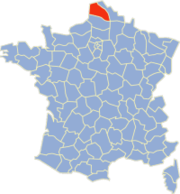Boulogne-sur-Mer
|
|
Boulogne-sur-Mer is a town in northern France, in the Pas-de-Calais département of which it is a sous-préfecture. It is located by the English Channel. Population of the city (commune) at the 1999 census was 44,859 inhabitants, whereas the whole metropolitan area (aire urbaine) had 135,116 inhabitants.
History
Originally named Gesoriacum, by the 4th century Boulogne was known to the Romans as Bononia and served as the major port connecting the rest of the empire to Britain. The emperor Claudius used this town as his base for the Roman invasion of Britain, in 43 AD, and until 296 it was the base of the Classis britannica.
In the Middle Ages it was the centre of a namesake county.
In the 19th century the Cathedral of Notre Dame was reconstructed by the priest Benoit Haffreingue after he received a call from God to reconstruct the town's ruined Basilica.
In the year 1905 the First Esperanto Universal Congress was held in Boulogne-sur-Mer. L. L. Zamenhof, the creator of Esperanto, was among the attendees. In the year 2005 there was held a great anniversary meeting with more then 500 attendees.
External link
- City council website (http://www.ville-boulogne-sur-mer.fr/) (in French)
- Boulogne 2005 Esperanto (http://boulogne2005.online.fr/) (en eo fr)de:Boulogne-sur-Mer

